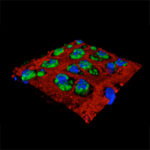
Researchers at Washington University have developed nanoparticles to treat the inflammation that wears away at joint cartilage in patients with osteoarthritis.
Traditional treatment methods to reduce inflammation involve steroid injections, but the body quickly washes them away, leaving the cells vulnerable to more inflammation.
“I see a lot of patients with osteoarthritis, and there’s really no treatment,” senior author Dr. Christine Pham said, according to the university. “We try to treat their symptoms, but even when we inject steroids into an arthritic joint, the drug only remains for up to a few hours, and then it’s cleared. These nanoparticles remain in the joint longer and help prevent cartilage degeneration.”
The nanoparticles, which are smaller than red blood cells, carry a protein bound to a small interfering RNA molecule. The molecules interfere with the process of inflammation, preventing further damage. Researchers tested the nanoparticles on mice after an injury and saw effects within 24 hours, which lasted for weeks after, according to a study published in the Proceedings of the National Academy of Sciences.
“The nanoparticles are injected directly into the joint, and due to their size, they easily penetrate into the cartilage to enter the injured cells,” co-investigator Dr. Samuel Wickline said. “Previously, we’ve delivered nanoparticles through the bloodstream and shown that they inhibit inflammation in a model of rheumatoid arthritis. In this study, they were injected locally into the joint and given a chance to penetrate into the injured cartilage.”
“The inflammatory molecule that we’re targeting not only causes problems after an injury, but it’s also responsible for a great deal of inflammation in advanced cases of osteoarthritis,” added Linda Sandell, director of Washington University’s Center for Musculoskeletal Research. “So we think these nanoparticles may be helpful in patients who already have arthritis, and we’re working to develop experiments to test that idea.”

